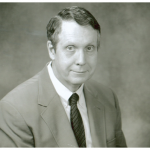Dr. Paulus was a member of that international panel and is, according to Dr. Felson, “a great person to have on a committee. He almost always has very valuable insights to problems, and doesn’t say anything unless it’s useful.” Dr. Felson also notes that Dr. Paulus was “open to any and all possibilities”—a quality Dr. Felson appreciated, in view of the fact that Dr. Paulus had already proposed his own definition of improvement in RA. “He could have been an unrelenting advocate for his own definitions, but he wasn’t at all.”
Continuing Guidance
Dr. Paulus ostensibly retired in 2000, the year that Dinesh Khanna, MD, now assistant professor, Division of Rheumatology, David Geffen School of Medicine, UCLA, began his fellowship at UCLA. “Retirement” entailed cessation of clinic duties, but Dr. Paulus has continued to come to the office nearly every day. In the intervening 10 years, says Dr. Furst, Dr. Paulus has become “sort of the go-to person for junior faculty and fellows.” Dr. Khanna and other junior faculty have been the beneficiaries of Dr. Paulus’ “open door policy.”
Dr. Khanna feels fortunate that one of the pioneers in clinical trial design has made himself available for consultation. “He helps you to clarify exactly what you are trying to ask [in a clinical trial],” notes Dr. Khanna. “Then, he helps you to think about a trial design from the standpoint of feasibility to validation of outcome measures. And his grantsmanship is exceptional in providing all kinds of useful, unbiased comments to help applications flow well.”
Dr. Khanna is one of several in the division who’ve attained their NIH K23 Young Investigators Awards under the purview of Dr. Paulus, in addition to their other mentors. Dr. Paulus has been a contributing author on a number of Dr. Khanna’s studies and is now contributing to work on the development of indices for scleroderma and Raynaud’s phenomenon.
Veena Ranganath, MD, assistant clinical professor, Division of Rheumatology, David Geffen School of Medicine, another K23 Young Investigator in the Division, has collaborated with Dr. Paulus and other members of the Western Consortium of Practicing Rheumatologists in a study comparing composite measures of disease activity in early seropositive RA patients.8 She finds Dr. Paulus’ method of mentoring very empowering. “He looks out for your best interests,” she notes. “He cultivates you to become an inquisitive researcher with integrity and enthusiasm, based on a foundation of solid science.”

